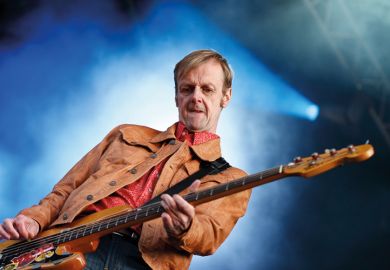My grandfather used to call academics “eternal students” because he didn’t really see the point of academics.
He saw them as these posh, rarefied beasts in an ivory tower, who didn’t come down to his level and do a proper day’s work – they dossed about and got up late and couldn’t put up a shelf and appeared on University Challenge. He didn’t see them as having any respect for him – a man who’d worked on a farm, then joined the army, then worked as a salesman and security guard; a man who’d left school at 12 and hadn’t seen the point of it when he had been there.
My grandfather was a good man, and a working-class man, but he didn’t really see the point of knowledge unless it had a practical purpose, unless it came from a place of work and care and pride.
I say used to because he changed his mind when I went to university. Not immediately; it wasn’t a sudden Damascene conversion – he was too stubborn for that – and it took a lot of arguments and talking. I was the first person in my family to go to university (not the only one, my brother followed three years later), and by that time my grandfather saw getting a degree as necessary, but not really any practical use.
He had ambitions for his daughter and grandchildren, the same ambitions my grandmother has, that my brother and I be educated, knowledgeable, practical people, who would have jobs we took pride in and opportunities he didn’t have – and if we had to go to university first, so be it.
My grandfather tried to understand some of what I was doing – and I’ll admit that I didn’t always tell him about all of it, because some of it did sound like bollocks even when it wasn’t – and whenever I’d explain he’d ask, “what’s the point of that, then?”
I always felt defensive, because his approval was important, and also I wanted him to see why it was important.
It was fairly easy with some of the physical geography stuff – he’d been a mountain climber and a sailor, he loved nature and anything that grew – but the human geography and sociology was harder. And sometimes, to wind him up (I am my mother’s daughter), I would tell him “because it’s interesting”. At which point either my grandmother or my mother would intervene because nobody had entirely forgotten the time he wouldn’t speak to me for days after I told him that he should read Windows for Dummies (a book, to help with his computer skills) and he thought I was calling him stupid, and that word was the number one cardinal sin in his eyes.
Sometimes, however, because it’s interesting would lead to better conversations, because if I took the time to tell him why it was interesting, and how it did fit in with the wider world – and usually when my grandmother prompted how it might be politically interesting or at the very least help to solve a crossword – then we would talk. And slowly he stopped referring to me as an eternal student like it was a bad thing, and started acknowledging that we did need people to look closely at things that don’t always look important straight away, and we need people who know a lot about one particular thing, whether it’s engineering or disability or astrophysics or 17th-century poetry.
He stopped dismissing academics or experts and started talking about “people like you” and nodding at me. There was a sort of pride there.
Which is all a rather long-winded way of saying why Glyn Davies’ tweets yesterday, in which he wrote: “Nothing more irritating than academics rubbishing the efforts of those operating at the sharp end, without facing up to the hard decisions”; and: “Personally, never thought of academics as ‘experts’. No experience of the real world” were so very, very infuriating.
Nothing more irritating than academics rubbishing the efforts of those operating at the sharp end, without facing up to the hard decisions.
— Glyn Davies (@glyndaviesmp) October 29, 2016
Personally, never thought of academics as 'experts'. No experience of the real world.
— Glyn Davies (@glyndaviesmp) October 29, 2016
I can see where the attitude comes from – Davies left school at 16, the same age as my father did, worked on a farm like my grandfather, and while he did go to university as a mature student in his fifties, he strikes me as a the sort of man who sees himself as practical; a “common-sense” thinker.
I disagree with his politics – he’s a Tory, and a Leave voter, for starters – but a read of his blog shows a man who cares about his constituency and doesn’t make snap decisions. Even if I think his decisions and opinions are totally wrong.
Apart from the bit where academics are experts – by dint of knowing a lot about a very specific thing, and thus having very specific expertise – Davies is wrong about academics not having experience of the real world. If nothing else, academics are not robots, they are people with families and friends, who pay rent or mortgages and do the supermarket shop and tweet about Strictly on a Saturday night and get drunk in pubs and start ranting about their pet hate.
Academics also think carefully about the impact of their work. They care. They might not work with their hands all the time – and the artificial divide between “mentally” and “physically” taxing work is another thing I will get to – but they do the work they do because they see value in it, and not just the value of knowledge in and for knowledge itself. They do the work they do because they want to make the world better, or because they want to make a change in the way the world works or is understood or how we see each other.
One of the reasons my grandfather looked down on academics is because he didn’t see their work as difficult, as labour-intensive. He valued physical work – for him, working hard meant work that left you tired, made you sweat or hurt. It took a lot for him to see my work – and before that, being a student – as work.
In a lot of ways, it took more to recognise my work as work than it did for him to see how academic expertise could be important. And we do devalue work that doesn’t strike us as immediately physical, especially physical in a masculine sense, in that care and cleaning work is devalued not because is it not physical (it is very physical), but because it is physical work associated with women, with feminine roles. We devalue service work because it is emotional labour; call centre work involves a lot of sitting and talking, but less heavy lifting, and while shop work involves a degree of heavy lifting, it also involves a lot of talking with people, of being polite to people and showing an interest in them.
And as teaching has emphasised people skills – managing a classroom – as transferring knowledge, it has become perceived of as emotional, and thus feminised, and devalued.
Davies’ tweets devalue emotional and non-masculine physical labour. They devalue academic knowledge in particular, by painting it as not “real” – not physical, not practical. He implies that academic knowledge is not real expertise because it has not come from masculine physical labour. He implies that careful thought – which drives innovation and change – is somehow not worth anything, can be ignored.
That attitude is a part of the systemic devaluation of academic work that has fed into the cuts to humanities research and teaching, the loss of “soft” A levels such as archeology and art history, and the growth of casual teaching contracts. That is why they annoyed me, not just the implication that by being a massive nerd I’m not also aware of the rest of the non-massive-nerd world.
And I like to think that my grandfather would have appreciated that, and would have joined me in grumbling about people who don’t realise when they’re talking rubbish.
Emma Sheppard is a PhD researcher at Edge Hill University. This article was originally published on her blog.
Register to continue
Why register?
- Registration is free and only takes a moment
- Once registered, you can read 3 articles a month
- Sign up for our newsletter
Subscribe
Or subscribe for unlimited access to:
- Unlimited access to news, views, insights & reviews
- Digital editions
- Digital access to THE’s university and college rankings analysis
Already registered or a current subscriber?





